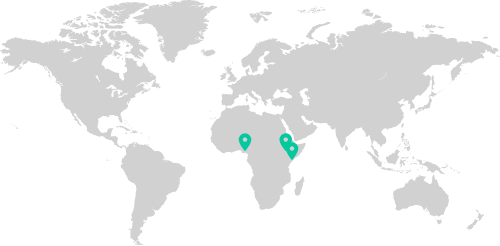Alliance for a Green Revolution in Africa (AGRA) Project: Why Africa needs climate-resilient and adaptable agricultural systems
Agriculture is key to Africa’s economic growth and development. It provides employment to more than 50% of the population, and agricultural products contribute a significant amount to the country's GDP. The majority of those engaged in agriculture are smallholder farmers who have to tackle multiple challenges to make a living from agriculture. The lack of resilient and adaptive agricultural production systems has made Africa particularly vulnerable to the effects of climate change. Extreme weather events have become more frequent and severe, and pest- and disease-related challenges such as locust attacks have increased.
A project by Cropin and Alliance for a Green Revolution in Africa (AGRA), which focuses on climate adaptation and climate resilience in agriculture, has brought much relief to smallholder farmers in Ghana, Nigeria, Burkina Faso, Mali, Tanzania, and Mozambique. Cropin and AGRA, an international development organization, have partnered on a project to build highly productive agricultural systems for farmers that are resilient and adaptable to climate change. The project started in 2020 and has positively impacted the lives of 3 million smallholder farmers with the benefits of technology.
The roadblocks on the path to climate resilience and adaptability
Blessed with vast tracts of land that can be cultivated across most countries, Africa has tremendous agricultural potential. However, most of the farming is done by smallholder subsistence farmers, who lack access to quality inputs and the latest farming technology.
They also lack the knowledge to efficiently use land, water, fertilizers, and pesticides to maximize production. Drastic climate change events such as extreme heat and droughts, devastating floods and storms, and an increase in destructive agricultural pests add to their problems. The COVID-19 pandemic and a locust infestation around the same period have led to massive agricultural and livelihood losses.
Modernizing the agricultural sector would be the first step toward building agricultural resilience in Africa. Investing in farming techniques that are science and technology-based could lead to climate-resilient, cost-effective, and sustainable farming methods. Initiated in 2020 and ongoing now, the Cropin- AGRA initiative attempts to reduce some of the challenges faced by smallholder farmers in Africa.
Making smallholder farming climate-resilient and adaptable in Africa
The Cropin-AGRA project for smallholder farmers in Ghana, Nigeria, Burkina Faso, Mali, Tanzania, and Mozambique focuses on:
- Piloting and then scaling digital solutions
- Adapting them to the local context
- Offering farmer advisory services, capacity building and training, and knowledge management
AGRA is an alliance led by Africans with origins in farming communities across the continent. It works for inclusive agricultural transformation in Africa by increasing incomes and improving food security for farming households in 11 focus countries and targets to touch 30 million farming households by 2021. AGRA collaborates with African governments, the private sector, civil society institutions, and development partners in the agricultural sector to bring about and sustain inclusive agricultural transformation in Africa.
Cropin initiated the project with test programs to check the adaptability of pilot solutions to local conditions. It then adopted the digital solutions to suit local needs and scaled them across the target area. Applications were localized for multi-country operations.
Cropin’s platform digitalized agricultural operations end—to—end in the six countries it was launched. Agricultural plots were geotagged and farm and farmers' data were digitized for accessibility through a centralized cloud platform.
Farmers were provided support with the Package of Practice (PoP) best suited for a specific crop and region. Agricultural inputs such as seeds, water, fertilizers, pesticides, etc., were tracked for compliance with dosages. Farmers were provided with information about the best periods for sowing. Timely pest and disease alerts prevented large-scale infestations and protected crops.
Crop monitoring for health, yield detection, and harvest readiness became stress-free for farmers with Cropin’s technology support. The digital platform helped with better practices and advisory, resulting in reduced production losses. This in turn enabled farmers to get better prices for their agricultural produce.
Cropin’s advisory services provided farmers access to information on best practices, SMS-based weather alerts, pest and diseases warnings, and crop protection advisories for timely action to prevent crop losses. The company’s weather-based advisory helped promote climate-smart agricultural practices among the farmers.
Best practices training by the field team helped farmers upgrade farming skills to precisely plan agricultural operations and make data-based decisions for maximum advantage.
Training programs for field officers, data collection, and monitoring through mobile applications ensured widespread adoption of the digital solution.
Knowledge management was another key focus area for the project. Field officers were provided with user manuals and regular feature update alerts. Streamlining data organization and management on the platform assured easy access to information for farmers.
The numbers tell a story of progress
Increasing farmers' access to extension services by digitizing Village Based Advisors (VBAs) is vital to AGRA's larger plan for agricultural transformation in Africa. Cropin’s training programs benefitted 10,626 entrepreneurial VBAs, thereby allowing project benefits to reach 3 million smallholder farmers. The digital presence of VBAs enabled better engagement with farmers.
Agricultural practices and the productivity and income of farmers across Ghana, Nigeria, Burkina Faso, Mali, Tanzania, and Mozambique improved through the digital solutions, information, and advisories provided by the Cropin-AGRA project. The project has led to creating a sustainable environment that promotes the overall development of the region, now and for the future — through local employment and entrepreneurship and by providing farmers access to adaptive, resilient, and highly productive agricultural systems.



